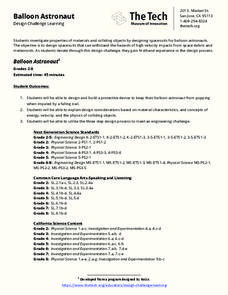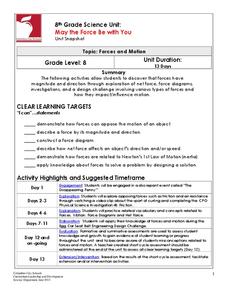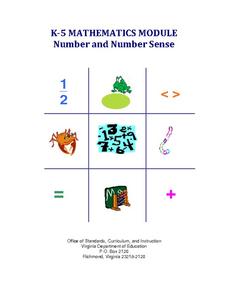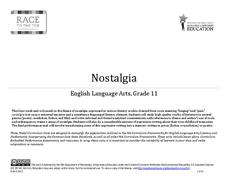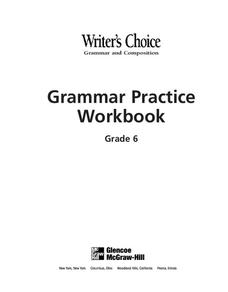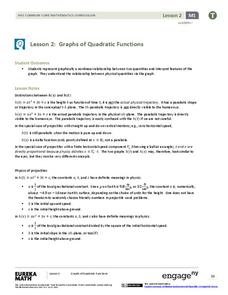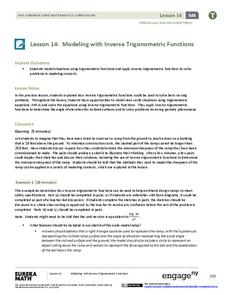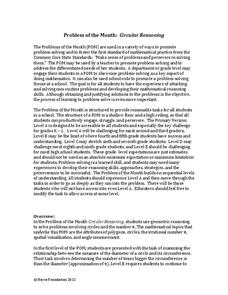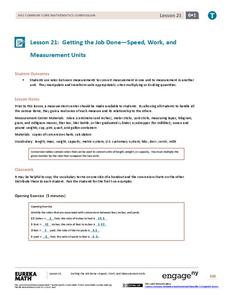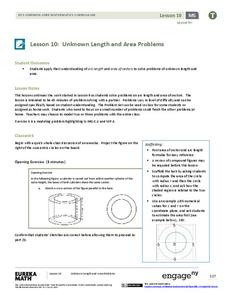Tech Museum of Innovation
Balloon Astronaut
Design protection from high-speed particles. The STEM lesson plan highlights why astronauts need protection from space debris. Pupils use the design process to design, build, and test a spacesuit that will protect a balloon from a...
Columbus City Schools
May the Force Be with You
You won't have to force your classes to complete these engaging activities! Through exploration, young scientists learn that force has both magnitude and direction. They draw force diagrams, investigate force models, and complete a...
Curated OER
K-5 Mathematics Module: Number and Number Sense
Reinforce number sense with a collection of math lessons for kindergarteners through fifth graders. Young mathematicians take part in hands-on activities, learning games, and complete skills-based worksheets to enhance proficiency...
Urbana School District
Fluids
In 1879, Sir William Crookes discovered the fourth state of matter, plasma. The presentation covers states of matter, phase changes, density, pressure Pascal's Principle, buoyant force, Archimedes' Principle, Bernoulli's Principle,...
EngageNY
Solving Area Problems Using Scale Drawings
Calculate the areas of scale drawings until a more efficient method emerges. Pupils find the relationship between the scale factor of a scale drawing and the scale of the areas. They determine the scale of the areas is the square of the...
American Statistical Association
A Sweet Task
Candy is always an effective motivator! A fun math activity uses M&M's and Skittles to explore two-way frequency tables and conditional probability. The candy can serve a dual purpose as manipulatives and experimental data.
Massachusetts Department of Education
Nostalgia
To prepare for crafting their own memoir, class members examine poetry by Margaret Atwood, Billy Collins, Robert Hayden, and Claude McKay, stories by Richard Rodriquez and Willa Cather, and Barry Levinson's film Avalon. They examine...
US Department of Energy
Solar Cooking
Who needs a barbecue grill to cook hot dogs when you have the amazing power of the sun at your disposal? Engage young scientists in learning about solar energy with this fun activity that turns a used Pringles can into a solar...
Art Institute of Chicago
Color Combinations
Explore color through an examination of pointillism and light. Class members view Georges Seraut's famous painting on a computer, zooming in and out to see the details and effects of the technique. They then cover how light and color are...
McGraw Hill
Grammar Practice Workbook
To an English teacher, the only sound worse than nails on a chalkboard is a student using improper grammar. Make poor grammar a problem of the past with this extensive collection of worksheets that covers...
Cornell University
Constructing and Visualizing Topographic Profiles
Militaries throughout history have used topography information to plan strategies, yet many pupils today don't understand it. Scholars use Legos and a contour gauge to understand how to construct and visualize topographic profiles. This...
EngageNY
Graphs of Quadratic Functions
How high is too high for a belly flop? Learners analyze data to model the world record belly flop using a quadratic equation. They create a graph and analyze the key features and apply them to the context of the video.
Teach Engineering
Swinging Pendulum
Get into the swing of things. Pupils use a pendulum to demonstrate the conversion of potential energy to kinetic energy and back. After measuring the speed of a pendulum and compare it to the calculated theoretical speed, they...
Exploratorium
Tired Weight
You don't need a scale to determine weight. This activity provides a way to use the concepts of air pressure and surface area to determine the weight of a vehicle by calculating the amount of weight each tire supports.
EngageNY
Using Permutations and Combinations to Compute Probabilities
Now that we know about permutations and combinations, we can finally solve probability problems. The fourth installment of a 21-part module has future mathematicians analyzing word problems to determine whether permutations or...
EngageNY
Modeling with Inverse Trigonometric Functions 2
Use inverse trigonometric functions to work with ramps, rabbits, and Talladega. The class models real-world situations with trigonometric functions and solves them using inverses in the 15th installment of a 16-part series. Pupils solve...
Noyce Foundation
Circular Reasoning
Examine the origin and application of pi in five different levels. The five lessons in the resource begin with an analysis of the relationship between the radius and circumference of a circle. The following lessons lead learners through...
EngageNY
Getting the Job Done—Speed, Work, and Measurement Units
How do you convert from one measurement to another? Pupils use unit rates to convert measurements from one unit to another in the 21st segment in a 29-part series. They convert within the same system to solve length, capacity,...
Curated OER
More on Conduction and Convection
Why do some items feel colder when they are the same temperature? How should you keep your soda cold? What makes the wind blow? These are just some of the things middle schoolers discover when completing a lesson on...
Alachua County Public Schools
Food Chain
Two to four players receive seven cards each, with plants, animals, or nitrates depicted. They place what they have onto their own empty game board with the objective to complete a food chain. The game is a fun way to reinforce learning...
Institute of Electrical and Electronics Engineers
Pendulum Time
Take your time with this lesson. Junior engineers read about different types of clocks and then work together to build a pendulum time-keeper. There are no hints as to how they might go about accomplishing this complex task, so you may...
EngageNY
Unknown Length and Area Problems
What is an annulus? Pupils first learn about how to create an annulus, then consider how to find the area of such shapes. They then complete a problem set on arc length and areas of sectors.
University of Colorado
Clay Planets
Why do scientists use models? In the first installment of 22, groups create scale models of our solar system. They then share and discuss their models.
EngageNY
Ratios
Create ratios using the boys and girls in the class. The first lesson in a 29-part series introduces ratios. Pupils learn to create ratios, write them, and model them with tape diagrams. Class members realize that there are different...
